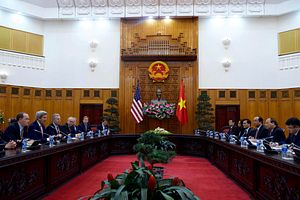On Wednesday, Vietnam’s Prime Minister Nguyen Xuan Phuc will be the first Southeast Asia leader to visit the White House since the inauguration of President Donald Trump, part of a three-day visit to the United States.
Now is the time for U.S. President Donald Trump to reassure Vietnam about Washington’s policy toward the South China Sea. Vietnam, as well as some other countries in East Asia and Southeast Asia, still expect U.S. leadership on one of the hottest points in the South China Sea issue: how to deal with China.
Vietnamese leadership has two main possibilities in terms of diplomatic relations. One option is to promote the value of its increasingly improved ties with the United States. The second option is to keep up Vietnam’s tendency of a moderate approach to China, in order to maintain stability at home and abroad.
Vietnam has made efforts to show its willingness to improve relations with the United States since Barack Obama administration. Vietnam, together with the Philippines, has been the most active in confronting China’s claims over the South China Sea.
Compared to the Philippines, Vietnam is perhaps even more forward-leaning, as many Vietnamese consider China their most hated enemy. From school books to thousands of articles on social media and discussions on every street corner, the word “China” has been always stirred up harsh feelings.
If faced with a choice between China and the United States, Vietnamese public opinion would choose the latter. Vietnamese appear more willing to forgive historical enmity with the United States. For example, consider the story of Fulbright University Vietnam’s launch back in 2016. Some Vietnamese media outlets criticized the appointment of former Senator Bob Kerrey as chairman of the board of the new school, because of his role in the massacre at Thanh Phong (Ben Tre) in February 1969. But public opinion at the time tended to protect Kerrey, and called for tolerance as both countries head for the future.
Looking at the history of the United States-Vietnam-China triangle, Vietnam has long played a very important role in the United States’ presence in the Asia-Pacific.
And if North Korea is Trump’s main foreign policy concern at the moment, he should also consider Vietnam’s stance. Last year, Hanoi, in an unusual move, condemned the North Korean nuclear test despite the fact that Pyongyang is one of the few remaining communist countries in the world. Observers consider that Vietnam could serve as the United States’ perfect “bridge” to North Korea.
Trump called on Vietnamese and other Association of Southeast Asia (ASEAN) leaders in April to discuss North Korea.
The improvement in Vietnam- U.S. relations is well-timed. China is accelerating its ambitions to control the South China Sea. According to Reuters, China recently installed rocket launchers on Fiery Cross Reef, a dispute feature in the South China Sea, in order to flex its military muscle. Some defense experts have argued that it might already be too late to stop Beijing from dominating the region.
At the same time, China has prompted ASEAN countries to reach an agreement on a South China Sea Code of Conduct (COC) after a meeting between Chinese and ASEAN officials in the Chinese city of Guiyang. The state-run Global Times hailed the progress on the COC, calling it a “symbol of the enhancement of China-ASEAN political mutual trust as well as strengthened will and capability by regional countries to handle regional affairs.” The China-ASEAN consultation “proves that regional countries can take full responsibility in maintaining South China Sea peace and stability without exterior disturbances,” Global Times continued.
The progress in China-ASEAN outreach might be partially explained by the fact that Vietnam’s hopes for U.S. support have been dimmed since Trump took office. Hanoi needs a commitment from the Trump administration over the South China Sea, and has not been satisfied with U.S. comments thus far.
Since quitting the Trans-Pacific Partnership, Trump has been silent on the South China Sea. Moreover, Trump’s attitude toward powerful allies such as Japan and South Korea has also become cold, in accordance with his “America First” policy. Instead of keeping close to these allies, Trump asked Japan and South Korea to pay more of the costs for sustaining U.S. troops, as well as suggesting that Seoul should pay $1 billion to deploy the U.S. Terminal High Altitude Area Defense (THAAD) system. Japan and South Korea have not been pleased, and this has raised potential concerns in Vietnam too.
Meanwhile, the Philippines seems to be turning toward China and away from the United States. President Rodrigo Duterte arrived in Russia on May 23, and praised Russian President Vladimir Putin as part of his efforts to end Manila’s dependence on the United States. Manila currently holds the rotating chairmanship of ASEAN, and can take advantage of that role to seek benefits. At the moment, Vietnam seems to be the only country in Southeast Asia that wants to be a strong U.S. ally in defying China’s sovereignty claims.
The attitude of the Philippines shows that Trump’s neglect of Asia leads to the risk of sharing U.S. influence in the region. As Trump prioritized bilateral relations over multilateral efforts and highlights the Middle East as the focal point of U.S. diplomacy, China has enlisted much of the Asia-Pacific to its side through a combination of repression and assurances, including the One Belt, One Road initiative. In this context, Phuc’s visit is a chance for Trump to seize back the initiative and give a clear statement of U.S. commitment to the Asia-Pacific.
Du Nhat Dang is a Vietnamese reporter who works for Tuoi Tre newspaper in Vietnam. He graduated from the Faculty of Journalism and Communication, University of Social Sciences and Humanites in Ho Chi Minh City. He is a fellow at the Reporting ASEAN program, which supports articles about ASEAN.
































